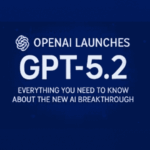In November 2025, OpenAI announced the release of a major update to its language model under the name GPT-5.1, which comes as an enhanced version of the GPT-5 series. This update represents an important step toward making ChatGPT smarter and more “human-like” in its interactions.
First, from a technical perspective, GPT-5.1 has been divided into two main versions:
- “Instant” version: Focuses on response speed while becoming “warmer” and more accurate in following instructions.
- “Thinking” version: Faster in simple tasks yet deeper and more stable in complex ones, meaning it “thinks more” before answering.
OpenAI states that the system now automatically routes users to the version most suitable for the type of question or task without requiring manual selection.
Second, regarding user experience, several changes have been introduced:
- Users can now pick a conversation style or “persona,” expanding the available tones such as friendly, professional, efficient, and more.
- Customization settings now apply to all conversations, not only new ones.
- Developers gained new tools, such as apply_patch for code modification and shell for running local shell-like commands, enhancing technical and professional use cases.
Third, in performance, OpenAI claims GPT-5.1 is faster and more efficient in token usage during simple tasks, while retaining deep-thinking capabilities for more complex reasoning. Evaluation data published by the company shows measurable improvements over GPT-5 in several benchmark tests, especially those involving programming and logical reasoning.
Fourth, regarding safety and risk mitigation, the update includes improvements not only in functionality but also in psychological-safety evaluations. OpenAI expanded its assessments to cover mental-health-related scenarios such as hallucinations, delusional thinking, or unhealthy emotional dependence on the model. These additions were documented in the system-card addendum for GPT-5.1.
What Does This Mean for Arabic-Speaking Users?
The newest update brings several advantages along with some challenges:
Advantages
- ChatGPT now feels more natural and less mechanical, making conversations smoother and more engaging.
- Conversation style options give users the ability to tailor the interaction to the context—formal for work, friendly for learning, etc.
- Adjustments in settings, such as writing preferences or formatting changes, apply immediately across all chats.
- Technical tools (like apply_patch and shell) expand the usefulness of ChatGPT for developers and advanced users.
Challenges
- Despite improvements, language models are still prone to errors, biases, and hallucination (producing inaccurate information).
- Some advanced features remain exclusive to paid tiers or developer plans.
- The chosen conversation “persona” may influence how information is interpreted or presented.
- The Arabic language still faces unique challenges in AI models, so improvements might be noticeable but not yet on par with English performance.
How Can You Benefit From These Updates?
If you’re currently using ChatGPT or planning to rely on it more, consider the following recommendations:
- Experiment with different conversation styles and select the one best suited to your context.
- Update your ChatGPT preferences so your custom settings apply universally across chats.
- If you use ChatGPT for work or coding, try the new developer tools or review the documentation for enhanced capabilities.
- Always maintain a critical mindset,verify information and evaluate results before acting on them.
- When writing in Arabic, provide clear context and review the output, especially when dealing with culturally specific expressions.
Conclusion
The GPT-5.1 update released by OpenAI marks a significant leap toward a smarter, faster, and more flexible ChatGPT, with enhanced tools for developers and a better overall conversational experience. At the same time, responsible and thoughtful usage remains essential. The improvements are substantial, but like all AI systems, the model is still evolving,especially in languages beyond English.














